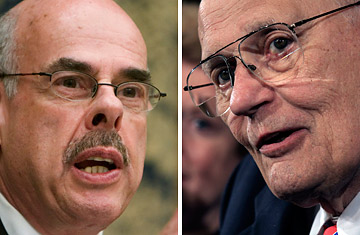
Rep. Henry Waxman, D-Calif., left, and Rep. John Dingell, D-Mich.
Nowhere but on Capitol Hill could a 69-year-old politician serving his 17th term be considered a Young Turk. But in challenging and unseating a committee chairman known as "the Truck," California Congressman Henry Waxman has succeeded in the kind of power sortie that happens only once every few decades in Congress — and put himself in a position where he will help determine the fate of much of Barack Obama's domestic agenda.
Many congressional veterans were surprised when House Democrats, meeting as a caucus, voted 137-122 to oust Michigan's John (the Truck) Dingell, 82, as chairman of the House Energy and Commerce Committee and give the post to Waxman. Few jobs in Congress are as powerful; the committee has one of the largest swaths of jurisdiction, encompassing energy, health-care and environmental issues. Waxman's elevation upends one of the most revered principles on Capitol Hill: the seniority system. "It's just been buried," says Representative Charlie Rangel of New York, chairman of the Ways and Means Committee. (See 10 Questions with Henry Waxman.)
Dingell, who was elected to Congress in 1955 to fill his father's seat after John Dingell Sr.'s death, has held the chairmanship since 1981. For almost as long, he has been tussling with Waxman on energy and environmental issues. The two battled over not only their beliefs but also their home-state interests; Dingell has been fiercely protective of Detroit's auto industry and the jobs it provides, while Waxman has championed environmental interests. Canny legislators both, they have been able to work together when compromise has served each of their interests, as it did with the Clean Air Act of 1990.
When Waxman decided to make a bid for Dingell's chairmanship, his supporters argued that Dingell would be an obstacle to Obama's efforts to wean Detroit — and the country — off its dependence on oil. Dingell's supporters, who included a number of other committee chairmen, expressed concern that Waxman would not be sensitive enough to the need to protect jobs as the country goes through that transition. Dingell's ouster also comes as the big automakers are foundering in their bid for a $25 billion bailout, another measure of the industry's declining power on Capitol Hill.
House Speaker Nancy Pelosi, Waxman's fellow Californian, has tangled with Dingell many times in the past and even donated money to his Democratic-primary opponent in 2002. Last year she created a special task force on global warming — headed by her close ally Massachusetts Congressman Ed Markey — a move that was seen as an end run around Dingell. However, she had stayed publicly neutral in the battle over the chairmanship.
Though Waxman represents what is probably the glitziest congressional district in the country — one that includes Hollywood and Beverly Hills — he is anything but glam. He boasts that he has never been to the Academy Awards and has been known in recent years for his investigative work on the decidedly unsexy House Government Reform Committee. Even when Democrats were out of power, Waxman and his talented staff churned out some 2,000 headline-grabbing reports, blasting the Bush Administration and the Republican Congress on everything from faulty prewar intelligence to arsenic in drinking water. When the Democrats regained control of the House and he took over the chairmanship of that panel in 2006, the headline of a TIME profile of Waxman described him as "The Scariest Guy in Washington." His operation is so respected that Obama picked longtime Waxman chief of staff Phil Schiliro to head the White House's congressional-liaison office.
But with Democrats now in control at both ends of Pennsylvania Avenue, those kinds of investigations are certain to be put on a back burner. And legislation has been Waxman's greatest passion since he was elected to Congress in the 1974 class of post-Watergate reformers. The walls of his office are covered with framed souvenir pens that were given to Waxman by Presidents from Ronald Reagan to Bill Clinton in recognition of the role he played in the landmark legislation they signed into law. Among those bills were generic-drug legislation, food- and toy-safety laws, Medicare catastrophic coverage and a safe-drinking-water law.
